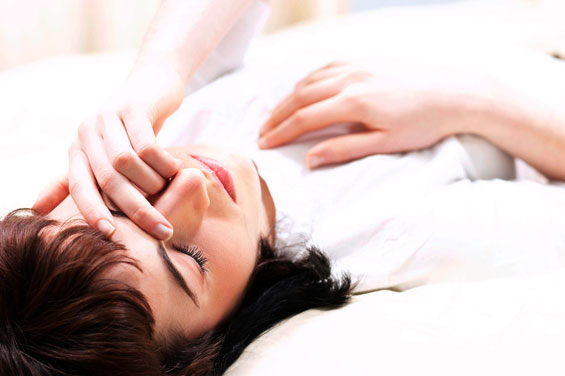
16 Oct Is Your Headache Related to TMJ Sleep Apnea?
If you get headaches and have pursued traditional treatments or medicines without any relief, you may be ready to give up. But hope is here as you may not have considered one surprising source of the head pain. Amazingly, sleep disordered breathing may be causing your headaches.
How are Headaches & Sleep Disordered Breathing Connected?
Sleep disordered breathing refers to a wide range of breathing irregularities. It may involve an obstruction of the airway during sleep, which prevents you from breathing regularly. Both your deepness and frequency of breathing may be compromised.
One cause may be TMJ sleep apnea. When this obstruction of the upper airway occurs, you are unable to get enough oxygen to the blood, in addition to not exhaling as much carbon dioxide as normal. Given these issues, many people with sleep disordered breathing experience headaches when they awaken.

About the Different Types of Headaches
Of course, there are many kinds of headaches. Typically, headaches are divided into four categories: Cluster, Sinus, Migraine, and Tension. Your physician can help you determine which one you have and can typically treat you, except when a headache results from TMJ sleep apnea.
Tension headaches account for the majority of headaches; an estimated 90 percent of all headaches fall into to the tension category. The pain comes from muscles tensing in the forehead for a variety of reasons.
If cluster headaches are what you suffer from, there is a high probability of a link existing with sleep disordered breathing. Sufferers of these types of headaches may also snore. Typically, people who snore and those with sleep disordered breathing have a high rate of headaches.
The Link Between Sleep Disordered Breathing & TMJ Disorder
If you have TMJ disorder or a dysfunction of the temporomandibular joint and snore, you may have sleep disordered breathing too. The reason is that the muscles in the temples of the forehead are key to the positioning and closing of the jaw. If your bite alignment between the top and bottom teach is irregular, it can result in immense tension in the temple muscles. In this case, the result is a headache.
You may also experience another unique symptom. Some sufferers explain that they feel as though the something is in their throats, although nothing is there.
TMJ disorder may overlap with sleep disordered breathing, as is the situation with TMJ sleep apnea. Other times, TMJ disorders have similar signs to sleep disordered breathing but in reality, the breathing issue has nothing to do with the temporomandibular joint.
Getting Dental Assistance for TMJ Dysfunction
If you have TMJ dysfunction, we suggest you ask your dentist to assess you for sleep disordered breathing too. If you are in Houston or elsewhere in Texas, Dr. Moradi has extensive training as a TMJ dentist and can determine accurately if your headaches and sleep apnea relate to TMJ. Contact the Houston office to screen for sleep disordered breathing and learn the treatments right for you.


